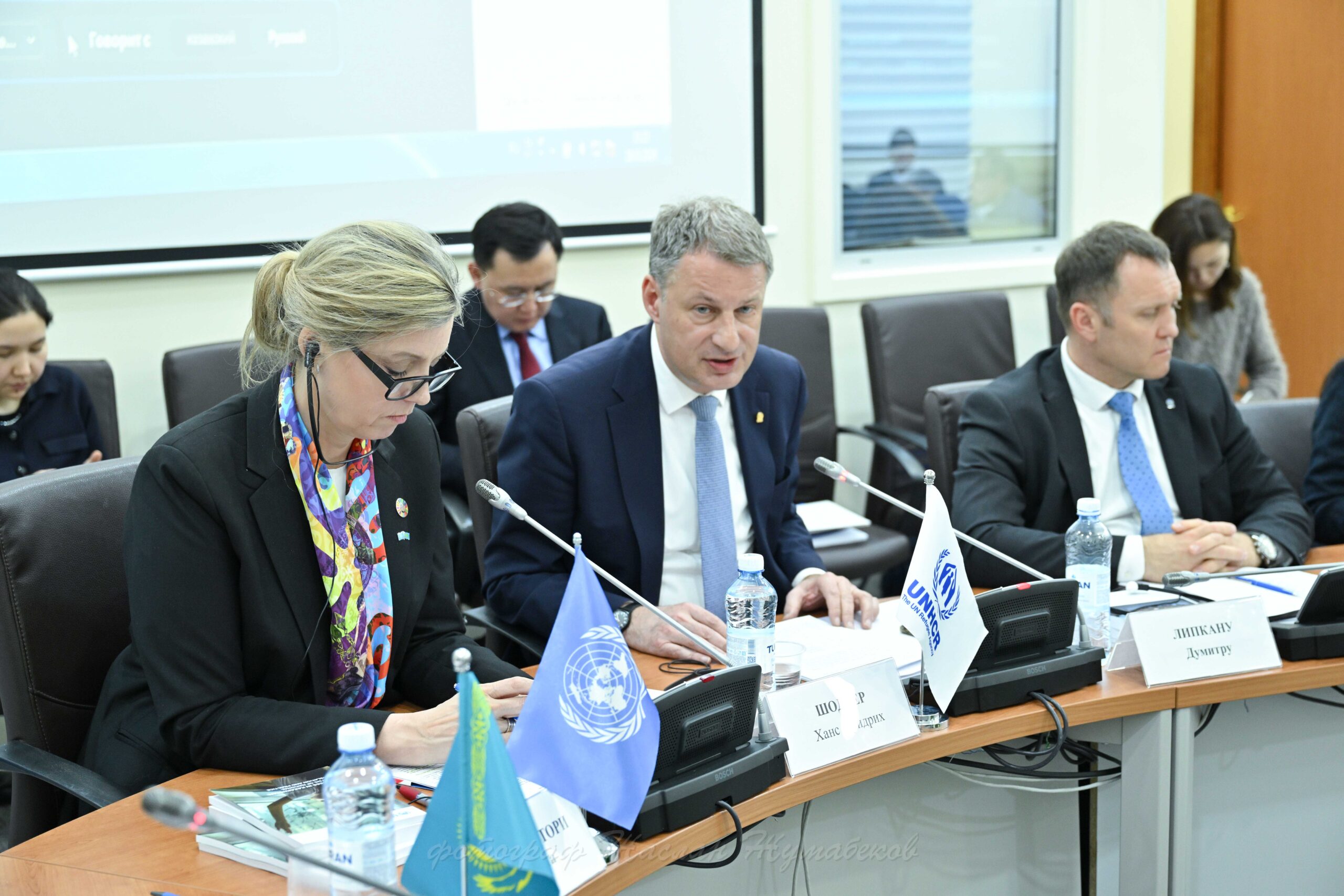
UN Resident Coordinator in Kazakhstan, Ms. Michaela Friberg-Storey, UNHCR Representative in Central Asia, Mr. Hans Friedrich Schodder, and UNHCR Deputy Representative, Dumitru Lipcanu
On 29 March UNHCR, the UN Refugee Agency, together with the Committee on Legislation and Judicial reform of the Mazhilis of Parliament of the Republic of Kazakhstan convened a thematic meeting “On issues of the legal status of refugees in Kazakhstan” for the Members of the Parliament.
The meeting aimed to raise the awareness of Parliamentarians to study the situation of refugees in the Republic of Kazakhstan and discuss improving national legislation with international standards.
The meeting commenced with opening remarks from Ms. Snezhanna Imasheva, Chair of the Committee on Legislation and Judicial Reform of the Mazhilis of Parliament, Ms. Aigul Kuspan, Chairperson of the Committee on Foreign Affairs, Defense and Security of the Mazhilis of Parliament, Mr. Arthur Lastayev, Kazakhstan Commissioner for Human Rights; Ms. Michaela Friberg-Storey, UN Resident Coordinator, and Mr. Hans Friedrich Schodder, UNHCR Representative for Central Asia. The Inter-Parliamentary Union Secretary-General, Martin Chungong, addressed the meeting via video message.
“The UN in Kazakhstan reaffirms our support for such an important mission of Kazakhstan in protecting and upholding the rights of asylum-seekers and refugees. Improving the situation of asylum-seekers and refugees in accordance with the spirit of the Universal Declaration of Human Rights and other human rights obligations will support Kazakhstan’s achievement of the 2030 Agenda to ensure no one is left behind,” said Ms. Michaela Friberg-Storey, UN Resident Coordinator in Kazakhstan.
During the meeting, UNHCR presented an analysis of national legislation and practices concerning refugees, available in English, Kazakh, and Russian languages. The analysis was commissioned by UNHCR as part of the ongoing work to support Kazakhstan in bringing its national legislation and practices with 1951 Refugee Convention and its 1967 Protocol standards. Additionally, the meeting featured the unveiling of the Kazakh version of the “Handbook for Parliamentarians – A Guide to International Refugee Protection and Building State Asylum Systems.” Developed jointly by UNHCR and the Inter-Parliamentary Union, this handbook serves two aims: to inform parliamentarians about the founding principles and obligations of international refugee law, and to mobilize their support for establishing and maintaining fair and effective national asylum systems, in line with international standards.
“Commending Kazakhstan’s efforts, including its pledges at the Global Refugee Forum in 2023, in promoting the establishment of efficient referral procedures and ensuring equal access to medical care, employment, education, and social assistance for refugees in Kazakhstan, aligning them with the rights of citizens and permanently residing foreigners, I encourage members of Parliament to urgently improve national legislation to align national legislation with international standards, to grant refugees due access to all the right and services they should enjoy under the 1951 Refugee Convention and other international human rights law,” said Mr. Hans Friedrich Schodder, UNHCR Representative for Central Asia.
Parliamentarians play a critical role in improving national legislation on refugees and bringing it in line with international law. UNHCR jointly with the Inter-Parliamentary Union (IPU) have long collaborated in supporting the ability of Parliaments to reform nationality laws in accordance with international standards.
As per 1951 Refugee Convention, States should treat refugees the same as nationals with respect to public relief and assistance and provide them with favourable access to naturalisation. Under current national legislation, however, refugees are only considered temporarily residing foreigners, which blocks their access to due social protection, healthcare, residency, and naturalization. In 2022, the government adopted a Migration Policy Concept for 2023-2027 which, inter alia, calls for implementation of provisions of the Refugee Convention relating to access to healthcare, employment, education, and social assistance on an equal basis with citizens and permanently residing foreigners. UNHCR works with the government to strengthen asylum procedures and improve national legislation to ensure that all refugees have access to due rights and services, including local integration, and can contribute to the sustainable development of Kazakhstan.
As of January 2024, Kazakhstan hosts 473 asylum-seekers and 262 refugees, who have been recognized as such by authorities under the national Law on Refugees.
See also: Issues of legal status of refugees in Kazakhstan discussed in Majilis.
Share on Facebook Share on Twitter